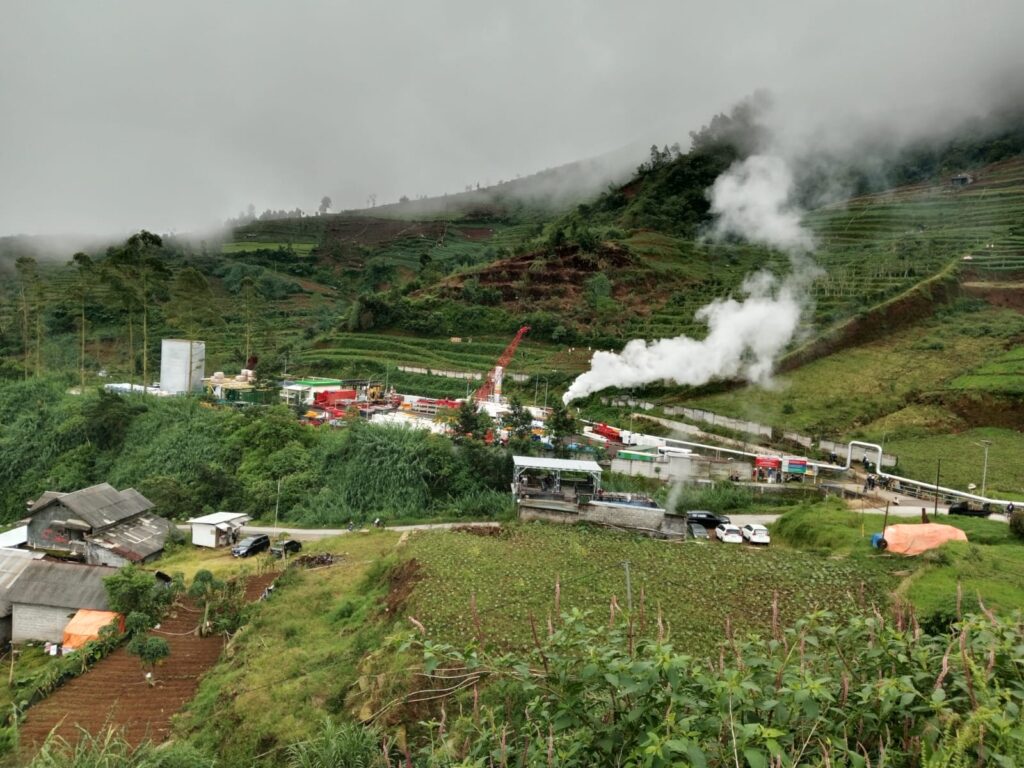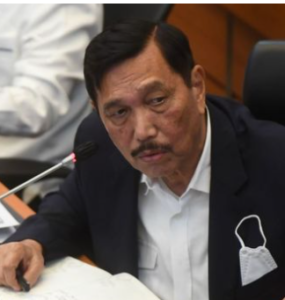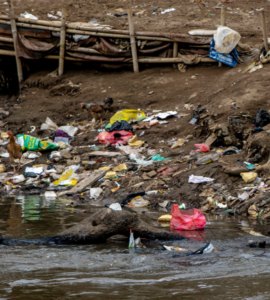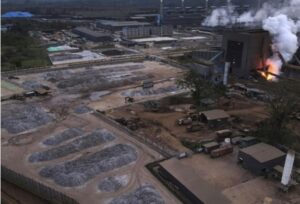
Dieng Wonosobo
STRATEGIC ASSESSMENT. Indonesia will soon impose up to a 200-percent import tariff on Chinese goods to mitigate the effects of the ongoing trade war between China and the United States. Trade Minister Zulkifli Hasan said the policy will take effect once the related regulation is issued. He said the trade war is causing an oversupply in China as their products face rejection by Western countries, forcing them to redirect exports to other markets like Indonesia.

President Jokowi in a limited meeting with a number of economic ministers was discussed the government’s plan to impose import duties of 200 percent on imported products from China. Industry Minister Agus Gumiwang Kartasasmita said the President has given a two-week deadline to finalize the report on this plan’s progress. However, Agus did not provide details regarding discussions within his ministry and other related ministries concerning the implementation of these regulations.
Indonesia’s plan to impose import duties of up to 200 percent on textile products is not targeted against specific countries like China, said Maritime Affairs and Investment Coordinating Minister Luhut Binsar Pandjaitan. Luhut explained that one step taken so far is the extension of safeguard tariffs already imposed on several textile products.

The government is reconsidering a plan announced last week to impose import duties of up to 200 percent on certain goods from China. The Trade Ministry now says that before making any decision on new tariffs, it will conduct a wide-ranging investigation into industries that have suffered heavy job losses in recent months, including textiles, apparel, footwear, ceramics, electronics, and cosmetics.
The latest report by Center for Strategic and International Studies (CSIS) said that the government’s commitment to a green economy is still lacking. CSIS director Yose Rizal Damuri said one effort that can be made to encourage sustainable investment and trade is to try to diversify investment in domestic sectors.
According to CSIS findings, Chinese investors currently account for more than 50 percent of investment in Indonesia. “In critical minerals, we are heavily reliant on China. Diversification will help us go further and create competition for domestic investment partners to achieve sustainable trade,” he said.
Indonesia’s Delta Dunia Group plans to grow through acquisitions after completing the $122.4 million purchase of Atlantic Carbon Group, director Iwan Salim said. The Jakarta-listed company has been diversifying beyond its home base of Indonesia where it runs its BUMA coal mining services business. It bought Australia’s Downer coal mining contractor business in 2021 and has now expanded into U.S. markets, securing ownership of four anthracite mines in Pennsylvania. The activity comes as major financial institutions have shied away from lending to fossil fuel companies given climate change concerns.
Indonesia Huabao Industrial Park (IHIP) together with its entity PT Bahosua Taman Industri Investment Group (PT BTIIG) plans to increase its investment in Morowali to IDR200 trillion. This step was taken in line with the increasing global demand for nickel-based products and the potential for regional economic growth.
PT BTIIG’s Irwan Wijaya said this increase in investment was part of the company’s strategy to strengthen Indonesia’s position as one of the main players in the world nickel industry. The IDR200 trillion will be for developing infrastructure and new production facilities in the Morowali industrial area.
The Statistics Indonesia (BPS) recorded that the number of poor people in Indonesia as of March 2024 was 25.22 million people. BPS Acting Principal Secretary Imam Machdi said the number was down 0.33 percent compared to the previous year’s population of 25.9 million.

The decline in poverty rate occurred in all Indonesian regions, with the most recorded in Bali and Nusa Tenggara. Java and Sumatra noted the biggest distribution of poverty in Indonesia; 13.42 million in Java and 5.55 million in Sumatra are still living in poverty.
BPS recorded that foreign tourist visits from January to May 2024 reached 5.2 million people. BPS Acting Chief Secretary Machdi said this figure reflected an increase of 23.78 percent from the same period last year. “This is the highest in the past four years since 2020,” he said in Jakarta.
Trade Minister Zulkifli Hasan sent off an export consignment of more than 190 tons of coffee beans to the United States from Deli Serdang district, North Sumatra. “I am grateful for the opportunity to send off the exports of 10 containers of coffee worth nearly US$1.5 million in total,” he said.
James David Spellman, Principal of Strategic Communications LLC in Washington DC said Central banks worldwide must rapidly escalate their generative artificial intelligence (AI) capabilities as they confront a new generation of risks and opportunities generated by technologies being designed to imitate human cognition.
That is one conclusion from a new study by the Bank for International Settlements (BIS) examining how AI abilities – amassing unfathomable volumes of data and instantaneously performing unimaginable calculations – are revolutionising global finance, in ways similar to transformations happening almost everywhere else. The report is equal parts concern and excitement.
One clue to the enormity of AI’s impact comes from the McKinsey Global Institute, which estimates that the technology could add as much as US$340 billion in value annually to the global banking sector, or 4.7 per cent of total industry revenues, largely through increased productivity. Already, 70 per cent of financial services firms surveyed worldwide use AI to enhance cash-flow predictions and improve liquidity management.
Indonesia’s first battery plant opened its doors marking a major milestone in the country’s efforts to build a complete EV manufacturing ecosystem. The plant in Karawang, West Java province, was developed by HLI Green Power, a joint venture between South Korean battery producer LG Energy Solution and carmaker Hyundai Motor that will also operate the facility.
South Korea’s Hyundai Motor Group and LG Energy Solution (LGES) was inaugurated Indonesia’s first battery cell production plant for electric vehicles with an annual capacity of 10 Gigawatt hours (GWh) of battery cells. The plant is part of a commitment by Hyundai Motor and LGES to invest up to $9.8 billion, opens new tab in Southeast Asia’s largest economy to develop an EV supply chain, the Indonesian government said, to benefit from rich resources of nickel and copper.
Developed nations such as the US need to invest in countries with vast reserves of critical minerals to reduce supply chain risks as these commodities are “the new oil” driving geopolitics, according to Indonesia’s Deputy Foreign Minister Pahala Mansury. Advanced countries need to see where the geo-economics are shifting and adjust their priorities as the world is already transitioning into renewable energy, Mansury said in an interview with Bloomberg News last week. This could help build better economic ties with Indonesia, the biggest producer of nickel, a metal that’s used for electric vehicle batteries, he said.

Indonesia is in the market for a wide-ranging critical minerals pact to boost its economy, the largest in Southeast Asia, as the US-China rivalry intensifies. While China is the nation’s biggest trading partner and has a stranglehold on the nickel processing sector, Indonesia sees the US playing a key role in its transition economy. There is “recognition from the US that renewable energy is actually a very strategic industry,” Mansury said. “Critical minerals are like the oil of the past, or they are actually the oil of the future.”
The high government debt incurred during the two consecutive terms of President Jokowi is expected to leave president-elect Prabowo Subianto with limited fiscal space for realizing his campaign promises and policy programs.
Climate Rights International released a 124-page report, “Nickel Unearthed: The Human and Climate Costs of Indonesia’s Nickel Industry,” documenting how the massive, multi-billion-dollar IWIP industrial complex in North Maluku and nearby nickel mining is violating the rights of local communities, including Indigenous peoples, causing significant deforestation and air and water pollution and emitting massive amounts of greenhouse gases.
In a rare admission, Indonesia’s government acknowledged the need to address sustainability in its nickel industry after German chemical giant BASF and French miner Eramet cancelled a US$2.6 billion nickel-cobalt refining complex project in the mineral-rich country. The termination comes amid falling prices of nickel and a campaign by non-government organisations who say the project in North Maluku province risked destroying rainforest inhabited by indigenous people.

French miner Eramet is exploring a partnership with Zhejiang Huayou Cobalt to produce battery-grade nickel in Indonesia, after a similar project with a European partner fell through last month. It is in talks for an ore supply agreement to a high-pressure acid leach (HPAL) plant run by the Chinese company in the Indonesia Weda Bay Industrial Park, people familiar with the matter said. The French company is also considering a stake in the Huayou-controlled Huafei plant, which is the world’s largest HPAL facility.
The Maritime Affairs and Investment Coordinating Ministry disclosed that at least 12 companies from China, Singapore, and locals are planning to build textile and textile product factories in Indonesia. Indonesian Textile Association (API) Chair Jemmy Kartiwa Sastraatmadja said he had no objections. However, he asked the government to give equal treatment to foreign and local investors who have long built the textile industry in the country.
The Trade Ministry announced it will study the potential implementation of two types of import duties to protect the textile and ceramic industries. Trade Minister Zulkifli Hasan revealed that the two types of import duties are the Safeguard Duty (BMTP) and the Anti-Dumping Duty. “If imports surge and harm our industries, under national regulations, we can impose the BMTP or Safeguard Duty,” Zulkifli Hasan said.





